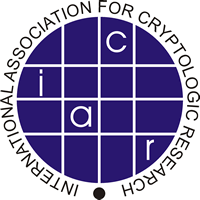Call for papers
Original papers on practical and theoretical aspects of cryptology are solicited for submission to Eurocrypt 2015, the 34th Annual Eurocrypt Conference. Eurocrypt 2015 is organized by the International Association for Cryptologic Research (IACR).
Instructions for Authors
The submission must be anonymous with no author names, affiliations or obvious references. The length of the submission must be at most 20 pages, including title page, abstract, references in a single column format, in 11pt fonts and with reasonable margins. We enable authors to provide supplementary material, either by using the new dedicated upload facility provided by the submission server, or by adding some clearly marked appendices to the submission. Reviewers are not required to access the supplementary material or to read appendices. We emphasise that the main part of the paper should be intelligible without the supplementary material, and should make a strong case for the submitted research to be accepted. The permissive length of 20 pages should be used with care: we solicit readable and high-quality submissions rather than congested papers. For accepted papers the length of the final version for Springer's LNCS will be at most 30 pages including title page, abstract, references and appendices, in the llncs class format.
It is encouraged that the submission be processed in LaTeX2e according to the instructions listed on Springer. These instructions are mandatory for the final, camera-ready versions. Submitted papers must be in PDF format and should be submitted electronically via the submission server. Submission deadline: September 28, 2014, 11:00 UTC.
The submission should begin with a title and a short abstract. The introduction should summarize the contributions of the paper at the level understandable for a non-expert reader. Authors are strongly advised to organize their submission, and present their results and supporting evidence, in such a way that reviewers with limited time can appreciate papers' contributions and verify claims. We stress again that the reviewers are not required to use supplementary material - the paper should be intelligible without them. Submissions not meeting these guidelines will be rejected without consideration of their merits. Submissions must not substantially duplicate work that any of the authors has published in a journal or a conference/workshop with proceedings, or has submitted/is planning to submit before the author notification deadline to a journal or other conferences/workshops that have proceedings. Accepted submissions may not appear in any other conference or workshop that has proceedings. IACR reserves the right to share information about submissions with other program committees to detect parallel submissions and the IACR policy on irregular submissions will be strictly enforced. For further details, see here.
We will run a two stage reviewing process, i.e. we will issue rejections for some papers after round one, and invite authors of papers that make it into round two to write rebuttals. These rebuttals will be then taken into account for the second discussion phase and the decision.
IACR asked all PC chairs of the 2015 IACR conferences to implement parallel sessions as part of the programme. We will strive to run parallel sessions throughout the conference, wishing that all papers/presenters receive a good audience.
The schedule is as follows:
- Submission deadline: September 28, 2014 (11:00 UTC)
- First round notification: November 26, 2014
- Rebuttals due: November 30, 2014
- Final notifications of acceptance or rejection by January 8, 2015
Conference Proceedings
Proceedings will be published in Springer's Lecture Notes in Computer Science and will be available at the conference. Authors of accepted papers must complete the IACR copyright assignment form for their work to be published in the proceedings, and guarantee that their paper will be presented at the conference. The final versions of the accepted papers will be due on January 30, 2015.
Program Committee
- Masayuki Abe (NTT, Japan)
- Gilles Barthe (IMDEA, Spain)
- Lejla Batina (Radboud University Nijmegen, Netherlands)
- Alex Biryukov (University of Luxembourg, Luxembourg)
- Sasha Boldyreva (Georgia Tech, USA)
- Jan Camenisch (IBM Research - Zurich, Switzerland)
- Anne Canteaut (INRIA, France)
- Liqun Chen (HP Labs, UK)
- Chen-Mou Cheng (National Taiwan University, Taiwan)
- Marten van Dijk (University of Connecticut, USA)
- Marc Fischlin (TU Darmstadt, Germany), co-chair
- Jens Groth (University College London, UK)
- Gregor Leander (Ruhr-Universität Bochum, Germany)
- Benoit Libert (ENS Lyon, France)
- Yehuda Lindell (Bar-Ilan University, Israel)
- Tetsu Iwata (Nagoya University, Japan)
- Marc Joye (Technicolor, USA)
- Charanjit Jutla (IBM Research, USA)
- Eike Kiltz (Ruhr-Universitšt Bochum, Germany)
- Markulf Kohlweiss (Microsoft Research, UK)
- Stefan Mangard (TU Graz, Austria)
- Steve Myers (Indiana University, USA)
- Gregory Neven (IBM Research - Zurich, Switzerland)
- Kaisa Nyberg (Aalto University, Finland)
- Elisabeth Oswald (University of Bristol, UK), co-chair
- Kenny Paterson (Royal Holloway, UK)
- Manoj Prabhakaran (University of Illinois at Urbana-Champaign, USA)
- David Pointcheval (ENS Paris, France)
- Emmanuel Prouff (ANSSI, France)
- Christian Rechberger (DTU, Denmark)
- Pankaj Rohatgi (Cryptography Research Inc., USA)
- Alon Rosen (IDC Herzliya, Israel)
- Alessandra Scafuro (UCLA, USA)
- Christian Schaffner (University of Amsterdam, Netherlands)
- Dominique Schröder (Saarland University, Germany)
- Martijn Stam (University of Bristol, UK)
- Francois-Xavier Standaert (Universitť catholique de Louvain, Belgium)
- Douglas Stebila (Queensland University of Technology, Australia)
- Frederik Vercauteren (KU Leuven, Belgium)
- Bogdan Warinschi (University of Bristol, UK)

